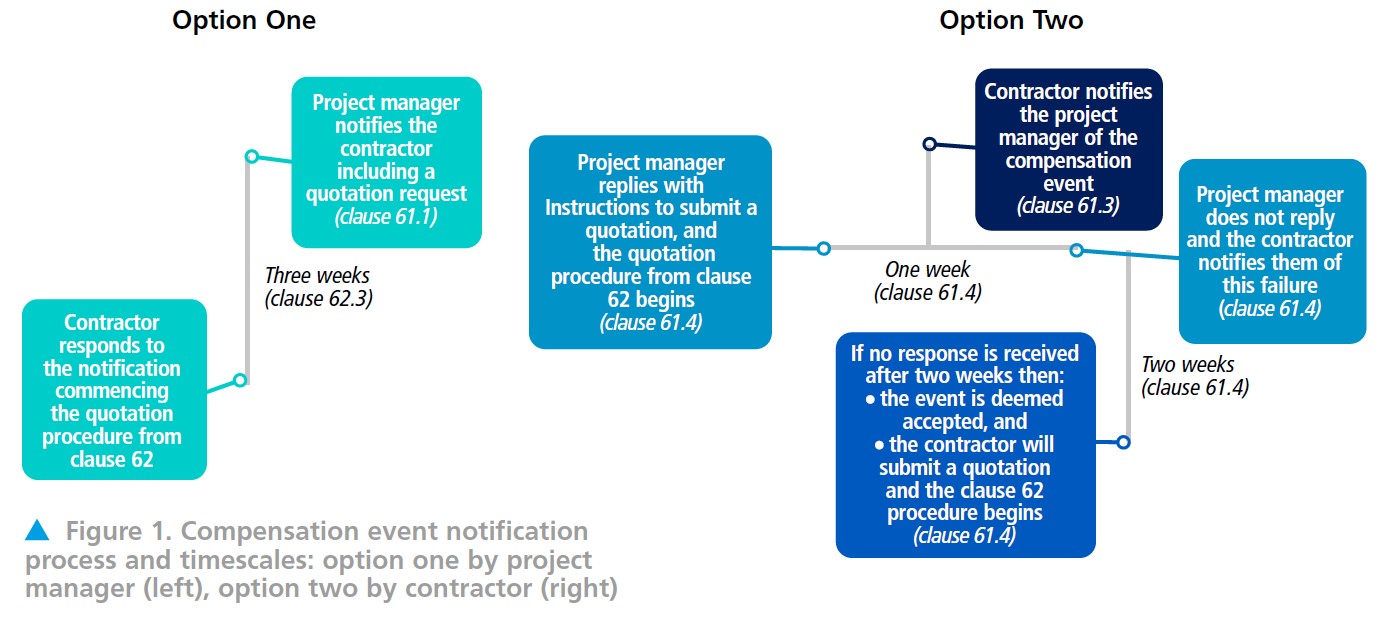
Key Points
- NEC compensation events are a mechanism for clients to pay contractors extra time and/or money for dealing with unexpected changes.
- Compensation events are set out in NEC4 ECC clause 60.1 and may also be included in the contract data.
- Project managers and contractors can notify compensation events, but they must follow strict timescales for notification, assessment and quotation to ensure fair and speedy resolution.
This is another in a series of short articles for new NEC users. It examines the key features and processes for compensation events in the NEC4 Engineering and Construction Contract (ECC).
Every client wishes its project to be delivered on time and on budget, but sometimes circumstances impact on the contractor’s ability to do so. NEC contracts manage this risk fairly and quickly by way of compensation events, which may entitle the contractor to additional time and/or money in certain circumstances.
A successful compensation event depends on both the project manager and contractor following strict timescales for notification, quotation and assessment. The result may be extra time, extra money, both or neither.
Typical compensation events
Twenty-one compensation events are listed in clause 60.1 of NEC4 ECC. They are wide ranging and cover many scenarios which could result in a change to the contract price or completion date.
Examples include:
- Project manager instructs changes to the scope (with some exceptions)
- Client does not give contractor access to the site by a specified date
- Client does not provide something to the contractor required for work to progress contractor does not follow contractual provisions on defects
- Contractor finds objects of value, historical or other interest at the site contractor experiences unexpected physical conditions or adverse weather client takes over the site or part of it early.
There is also the option for clients to add bespoke compensation events in the contract data if they have specific circumstances they wish to cater for which are not already covered in clause 60.1.
Compensation events do not occur automatically, they rely on the parties following the contractual notification requirements. They can be notified at any time during the course of a project but not after the defects certificate has been issued.
Compensation events should not be a surprise to the parties when they are notified as they should be captured in the early warning register (see Campbell, 2023).
How the process works
Either party can notify the other of a compensation event depending on the factors (see below). Where the contractor notifies a compensation event, it must do so when it happens or before it happens if possible. If the project manager has not received a notification within eight weeks of the event occurring, the contractor is not entitled to additional time or money even if it makes a compelling case.
 The time bar is a tool to proactively manage the contract and avoid compensation events building up as the project progresses. It reinforces the principle of collaboration as it encourages the parties to continually review the project and consider additional time and/or money as and when circumstances arise.
The time bar is a tool to proactively manage the contract and avoid compensation events building up as the project progresses. It reinforces the principle of collaboration as it encourages the parties to continually review the project and consider additional time and/or money as and when circumstances arise.
On receipt of a compensation event notification, the project manager has one week (unless there is agreement to a longer period) to assess whether it is valid. If it is, then the contractor has three weeks to submit a quotation setting out the time and cost impact for the project.
The project manager must respond to a notification within a week otherwise the compensation event is automatically construed as such, and the contractor is entitled to submit a quotation even if the compensation event does not strictly qualify when assessed against the provisions of the contract.
The parties then follow the quotation provisions to assess whether the contractor is entitled to additional time or money. Finally, the parties follow the implementation provisions to adjust the prices and the programme if additional time and/or money is granted.
Summary
Compensation events deal with both time and money – there is often a misconception that they only deal with cost because that is what we generally associate the terms ‘compensation’ and ‘quotation’ with.
A compensation event must fall within one of the categories set out in clause 60.1 or as identified in the contract data to be considered. Compensation events should be identified on the early warning register before they are assessed and implemented.
Quotations for compensations should detail how much additional money the contractor needs as well as how much additional time it requires (in either case, this could be zero).
The compensation event provisions include a number of ‘deeming’ provisions, meaning if certain timescales are not met, a compensation event may be accepted by default. The provisions for assessing compensation events should be followed in full and timescales complied with to avoid this happening.
Reference
Campbell L (2023) Early warnings – an introduction for new NEC users. NEC Newsletter 128 (November 2023): 10.




